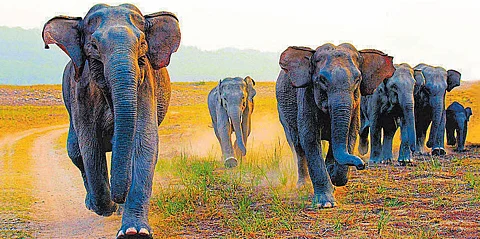

Human-elephant conflict is particularly severe in regions like Hassan and Kodagu, leading to frequent crop loss and even fatalities.
ISTOCK
Karnataka Minister Eshwar Khandre on Tuesday said the state government signed a Memorandum of Understanding (MoU) with the Indian Institute of Science (IISc) to use modern technology for conserving elephant corridors and habitats, aiming to reduce rising human-elephant conflict and protect crops of farmers living near forest fringes.
The Forest Department, in collaboration with the IISc, is set to implement a five-year collaborative project titled "Landscape-Level Management of the Asian Elephant in the Mysore Elephant Reserve."
The Rs 4.74 crore project will be funded by the Forest Department and monitored through biannual review meetings, annual reports, and a real-time data dashboard.
Speaking at the MoU signing event, Khandre said the human-elephant conflict is particularly severe in regions like Hassan and Kodagu, leading to frequent crop loss and even fatalities.
The department is taking all possible measures to address the issue, he said, adding that the conflict is now spreading to other regions as well.
The agreement aims to protect elephant corridors and habitats by integrating environmental research with on-ground implementation.
Karnataka is home to 6,395 wild elephants, making it one of the most significant elephant ranges in Asia.
The project will use modern technologies such as satellite telemetry, camera traps, and GIS models to identify key corridors and obstacles to elephant movement.
It will also assess the physical and stress levels of elephants by analysing hormones in dung samples. Additionally, the project will study crop damage patterns, monitor elephants involved in conflict, and raise awareness among farmers.
As part of the initiative, research will focus on developing early warning systems that alert communities when elephants approach human settlements. It will also explore sound-based deterrents to drive elephants away safely.
Forest officials said researchers from the department and IISc will collect data on elephant behaviour and movement to identify active corridors and predict future conflict zones over the next decade.
The project will be implemented across major forest divisions and protected areas under the Mysore Elephant Reserve, including tiger reserves, national parks, wildlife sanctuaries, and adjoining agricultural zones.
According to a statement from the Forest Department, the research will be conducted in collaboration with the Centre for Ecological Sciences (CES) at IISc, the Asian Nature Conservation Foundation, Foundation for Ecological Research, Advocacy and Learning (FERAL), and the National Institute of Advanced Studies (NIAS).
The project will also support the development of innovative tools such as soft-release protocols for relocated elephants, GPS-zap collars, buzzers, and community-supported fencing to manage displaced elephants, the statement added.